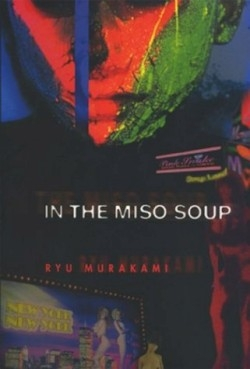
In the Miso Soup
Tour guide of the night Kenji realizes that all is not well with his latest job when a piece of burnt human skin ends up stuck to his front door—and that’s just the beginning of his problems.
The twenty-year-old protagonist is a Japanese tour guide who specializes in leading gaijin around the dark underside of the Tokyo sex world. From visiting peep shows to procuring prostitutes, Kenji has the street smarts to ensure his clients a wild night on the town, provided they have the money to spend and the perversity to live out their fantasies. Kenji has seen everything—until he meets his new client, Frank.
Frank is an overweight American tourist whose slightly “off” demeanor barely masks a horribly anti-social and demented nature. Over three eventful nights, Kenji—whose profession leaves him far from innocent—learns what true fear is.
As Frank and Kenji make their way through Tokyo, they encounter a cast of characters that paints a detailed picture of the sex industry in Japan. From high school girls who “chat” with businessmen for cash to hard-boiled hostesses, the author’s portrayal of nightlife is impressive in its grimness and lack of sentimentality; there are no Madama Butterflies among Murakami’s prostitutes.
Murakami’s presentation of some unsavory aspects of his country is refreshing in its straightforward and unapologetic details. He offers no analysis or critique of the seamy underworld that is both part of and separate from mainstream Japanese society. He is very successful in removing a sense of the exotic that often filters into foreign books newly introduced to the English-reading public.
Conventional wisdom states that the lyricism of the Japanese language does not translate well into English. McCarthy has translated several other books from Japanese and has written and edited bilingual children’s classic tales. His translation here is not overly austere and retains the flavor of the author’s intentional dullness to the horrors Kenji encounters during his adventures with Frank. Kenji describes a climactic murder sequence as if he were in a nightmare, and the novel’s prose takes on a similarly dreamy and unrealistic tone. Subtly, Murakami lulls both Kenji and the reader into a state of detachment insulated from the gross realities he depicts.
Murakami is a decorated writer in Japan, with thirty novels to his credit. It is easy to see from this one why he is such an exciting young postmodern writer. This is not a novel for the faint-hearted, but it will surely find an audience in a world where Kill Bill is a hit movie.
Reviewed by
Johanna Massé
Disclosure: This article is not an endorsement, but a review. The publisher of this book provided free copies of the book to have their book reviewed by a professional reviewer. No fee was paid by the publisher for this review. Foreword Reviews only recommends books that we love. Foreword Magazine, Inc. is disclosing this in accordance with the Federal Trade Commission’s 16 CFR, Part 255.
